BSc Business Law Case Study: Green Courier Services and Company Law
VerifiedAdded on 2022/12/01
|9
|2545
|372
Case Study
AI Summary
This case study analyzes various aspects of business law, focusing on Green Courier Services. It begins with an overview of different legal types of business organizations, including sole proprietorships, partnerships, and companies, along with the steps involved in forming a company. The study then examines the potential impact of employment and contract law on Green Courier Services, highlighting key legislation such as the Data Protection Act, Health and Safety at Work Act, National Minimum Wages Act, and Equality and Diversity Act. Furthermore, it delves into the duties of directors under company law, as defined by the Companies Act 2006, and the responsibilities of companies when raising capital, during company meetings, and shareholder meetings. The study also explains how company resolutions are passed, differentiating between ordinary and special resolutions. The conclusion emphasizes the broad scope of business law, encompassing contract, company, and employment law, and the importance of compliance with relevant regulations.

Case Study 2
Paraphrase This Document
Need a fresh take? Get an instant paraphrase of this document with our AI Paraphraser
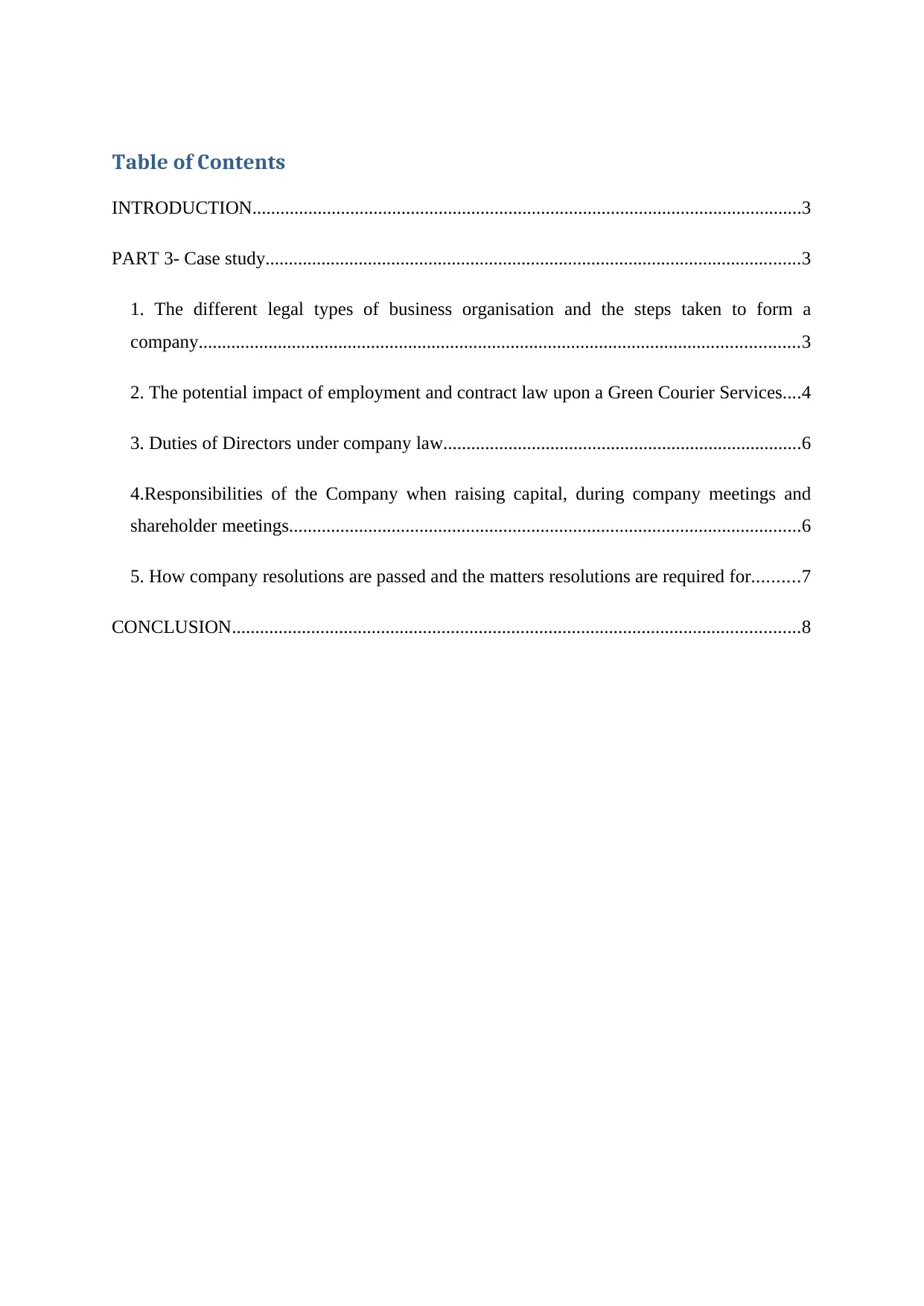
Table of Contents
INTRODUCTION......................................................................................................................3
PART 3- Case study...................................................................................................................3
1. The different legal types of business organisation and the steps taken to form a
company.................................................................................................................................3
2. The potential impact of employment and contract law upon a Green Courier Services....4
3. Duties of Directors under company law.............................................................................6
4.Responsibilities of the Company when raising capital, during company meetings and
shareholder meetings..............................................................................................................6
5. How company resolutions are passed and the matters resolutions are required for..........7
CONCLUSION..........................................................................................................................8
INTRODUCTION......................................................................................................................3
PART 3- Case study...................................................................................................................3
1. The different legal types of business organisation and the steps taken to form a
company.................................................................................................................................3
2. The potential impact of employment and contract law upon a Green Courier Services....4
3. Duties of Directors under company law.............................................................................6
4.Responsibilities of the Company when raising capital, during company meetings and
shareholder meetings..............................................................................................................6
5. How company resolutions are passed and the matters resolutions are required for..........7
CONCLUSION..........................................................................................................................8
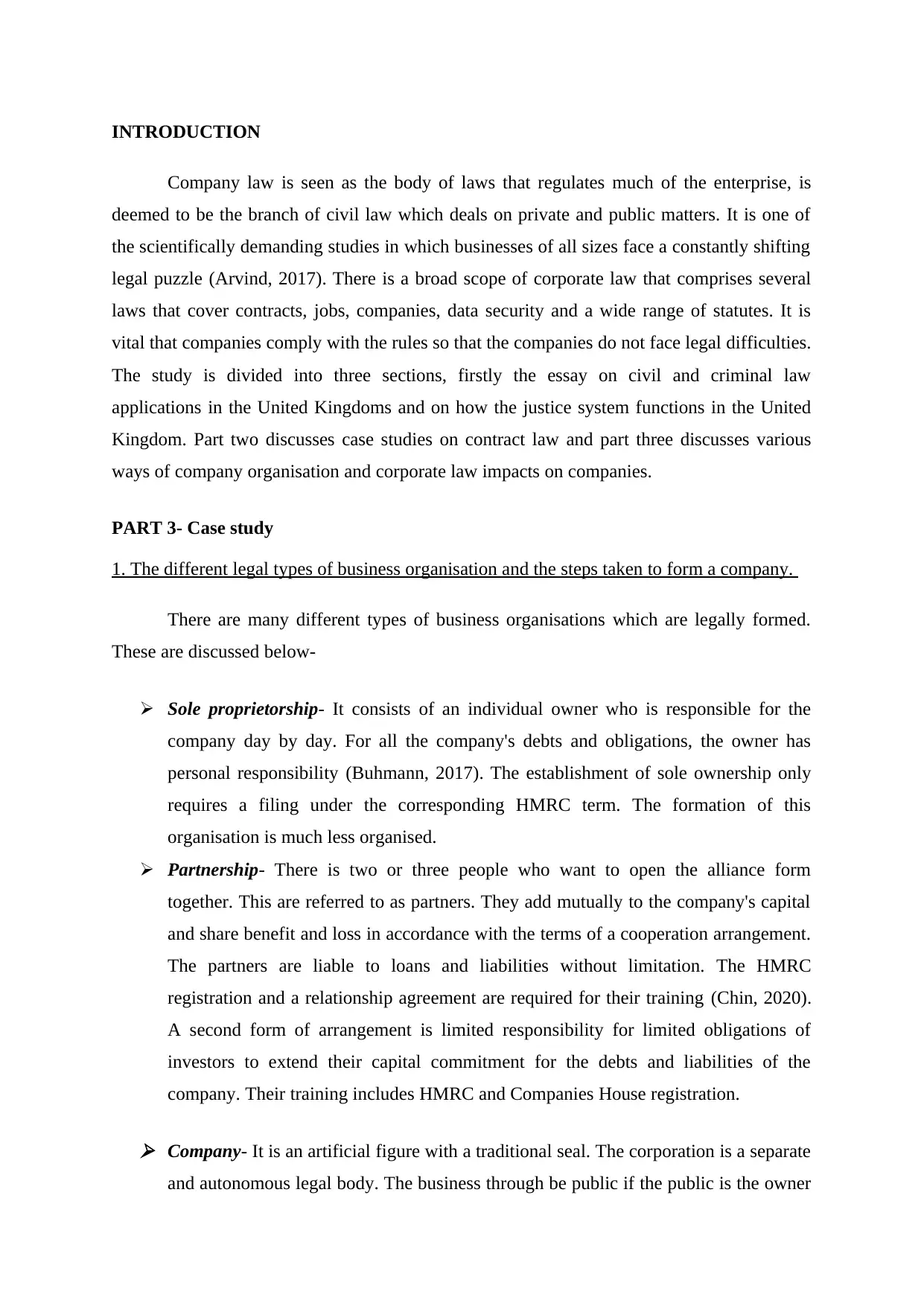
INTRODUCTION
Company law is seen as the body of laws that regulates much of the enterprise, is
deemed to be the branch of civil law which deals on private and public matters. It is one of
the scientifically demanding studies in which businesses of all sizes face a constantly shifting
legal puzzle (Arvind, 2017). There is a broad scope of corporate law that comprises several
laws that cover contracts, jobs, companies, data security and a wide range of statutes. It is
vital that companies comply with the rules so that the companies do not face legal difficulties.
The study is divided into three sections, firstly the essay on civil and criminal law
applications in the United Kingdoms and on how the justice system functions in the United
Kingdom. Part two discusses case studies on contract law and part three discusses various
ways of company organisation and corporate law impacts on companies.
PART 3- Case study
1. The different legal types of business organisation and the steps taken to form a company.
There are many different types of business organisations which are legally formed.
These are discussed below-
Sole proprietorship- It consists of an individual owner who is responsible for the
company day by day. For all the company's debts and obligations, the owner has
personal responsibility (Buhmann, 2017). The establishment of sole ownership only
requires a filing under the corresponding HMRC term. The formation of this
organisation is much less organised.
Partnership- There is two or three people who want to open the alliance form
together. This are referred to as partners. They add mutually to the company's capital
and share benefit and loss in accordance with the terms of a cooperation arrangement.
The partners are liable to loans and liabilities without limitation. The HMRC
registration and a relationship agreement are required for their training (Chin, 2020).
A second form of arrangement is limited responsibility for limited obligations of
investors to extend their capital commitment for the debts and liabilities of the
company. Their training includes HMRC and Companies House registration.
Company- It is an artificial figure with a traditional seal. The corporation is a separate
and autonomous legal body. The business through be public if the public is the owner
Company law is seen as the body of laws that regulates much of the enterprise, is
deemed to be the branch of civil law which deals on private and public matters. It is one of
the scientifically demanding studies in which businesses of all sizes face a constantly shifting
legal puzzle (Arvind, 2017). There is a broad scope of corporate law that comprises several
laws that cover contracts, jobs, companies, data security and a wide range of statutes. It is
vital that companies comply with the rules so that the companies do not face legal difficulties.
The study is divided into three sections, firstly the essay on civil and criminal law
applications in the United Kingdoms and on how the justice system functions in the United
Kingdom. Part two discusses case studies on contract law and part three discusses various
ways of company organisation and corporate law impacts on companies.
PART 3- Case study
1. The different legal types of business organisation and the steps taken to form a company.
There are many different types of business organisations which are legally formed.
These are discussed below-
Sole proprietorship- It consists of an individual owner who is responsible for the
company day by day. For all the company's debts and obligations, the owner has
personal responsibility (Buhmann, 2017). The establishment of sole ownership only
requires a filing under the corresponding HMRC term. The formation of this
organisation is much less organised.
Partnership- There is two or three people who want to open the alliance form
together. This are referred to as partners. They add mutually to the company's capital
and share benefit and loss in accordance with the terms of a cooperation arrangement.
The partners are liable to loans and liabilities without limitation. The HMRC
registration and a relationship agreement are required for their training (Chin, 2020).
A second form of arrangement is limited responsibility for limited obligations of
investors to extend their capital commitment for the debts and liabilities of the
company. Their training includes HMRC and Companies House registration.
Company- It is an artificial figure with a traditional seal. The corporation is a separate
and autonomous legal body. The business through be public if the public is the owner
⊘ This is a preview!⊘
Do you want full access?
Subscribe today to unlock all pages.

Trusted by 1+ million students worldwide
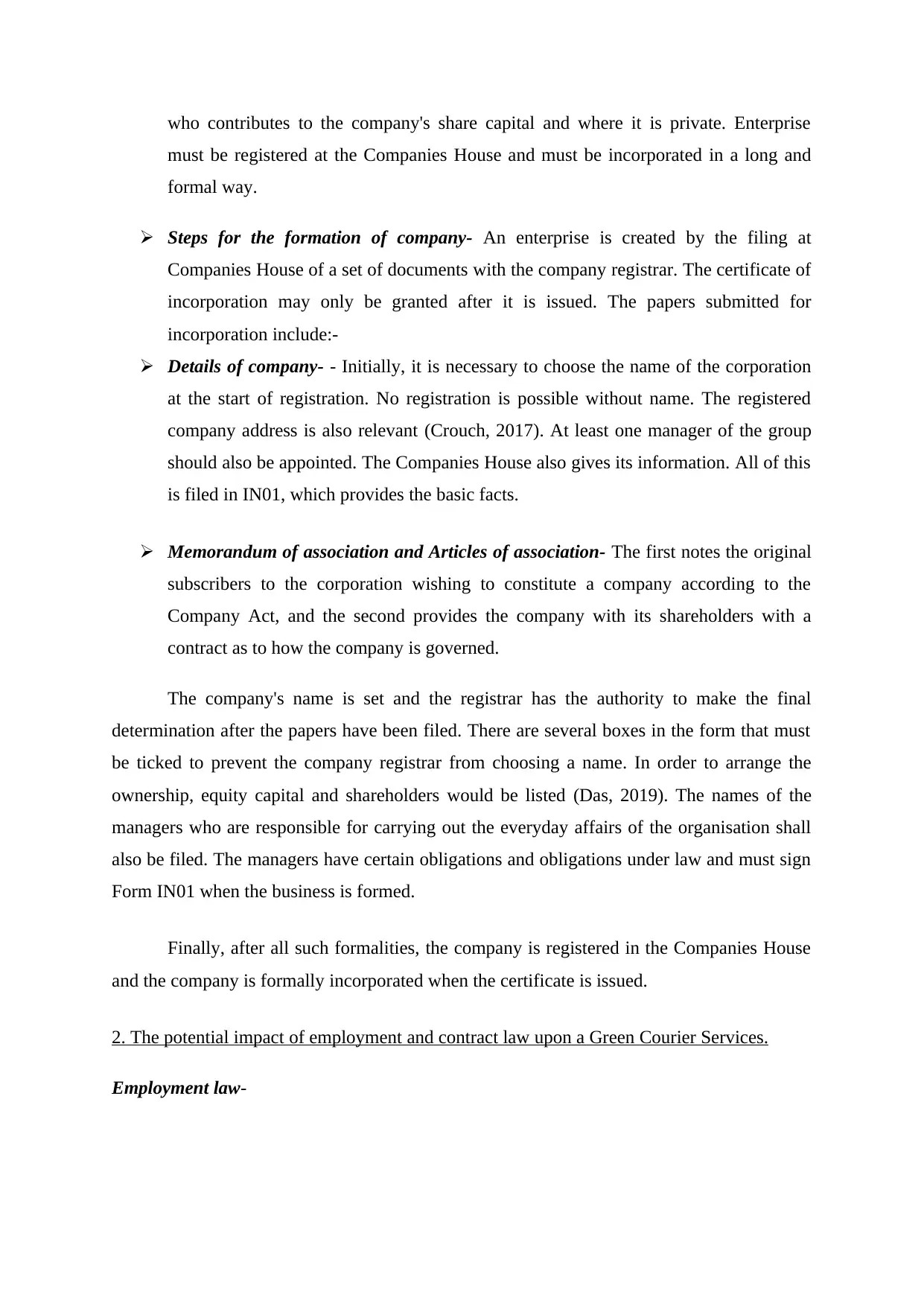
who contributes to the company's share capital and where it is private. Enterprise
must be registered at the Companies House and must be incorporated in a long and
formal way.
Steps for the formation of company- An enterprise is created by the filing at
Companies House of a set of documents with the company registrar. The certificate of
incorporation may only be granted after it is issued. The papers submitted for
incorporation include:-
Details of company- - Initially, it is necessary to choose the name of the corporation
at the start of registration. No registration is possible without name. The registered
company address is also relevant (Crouch, 2017). At least one manager of the group
should also be appointed. The Companies House also gives its information. All of this
is filed in IN01, which provides the basic facts.
Memorandum of association and Articles of association- The first notes the original
subscribers to the corporation wishing to constitute a company according to the
Company Act, and the second provides the company with its shareholders with a
contract as to how the company is governed.
The company's name is set and the registrar has the authority to make the final
determination after the papers have been filed. There are several boxes in the form that must
be ticked to prevent the company registrar from choosing a name. In order to arrange the
ownership, equity capital and shareholders would be listed (Das, 2019). The names of the
managers who are responsible for carrying out the everyday affairs of the organisation shall
also be filed. The managers have certain obligations and obligations under law and must sign
Form IN01 when the business is formed.
Finally, after all such formalities, the company is registered in the Companies House
and the company is formally incorporated when the certificate is issued.
2. The potential impact of employment and contract law upon a Green Courier Services.
Employment law-
must be registered at the Companies House and must be incorporated in a long and
formal way.
Steps for the formation of company- An enterprise is created by the filing at
Companies House of a set of documents with the company registrar. The certificate of
incorporation may only be granted after it is issued. The papers submitted for
incorporation include:-
Details of company- - Initially, it is necessary to choose the name of the corporation
at the start of registration. No registration is possible without name. The registered
company address is also relevant (Crouch, 2017). At least one manager of the group
should also be appointed. The Companies House also gives its information. All of this
is filed in IN01, which provides the basic facts.
Memorandum of association and Articles of association- The first notes the original
subscribers to the corporation wishing to constitute a company according to the
Company Act, and the second provides the company with its shareholders with a
contract as to how the company is governed.
The company's name is set and the registrar has the authority to make the final
determination after the papers have been filed. There are several boxes in the form that must
be ticked to prevent the company registrar from choosing a name. In order to arrange the
ownership, equity capital and shareholders would be listed (Das, 2019). The names of the
managers who are responsible for carrying out the everyday affairs of the organisation shall
also be filed. The managers have certain obligations and obligations under law and must sign
Form IN01 when the business is formed.
Finally, after all such formalities, the company is registered in the Companies House
and the company is formally incorporated when the certificate is issued.
2. The potential impact of employment and contract law upon a Green Courier Services.
Employment law-
Paraphrase This Document
Need a fresh take? Get an instant paraphrase of this document with our AI Paraphraser
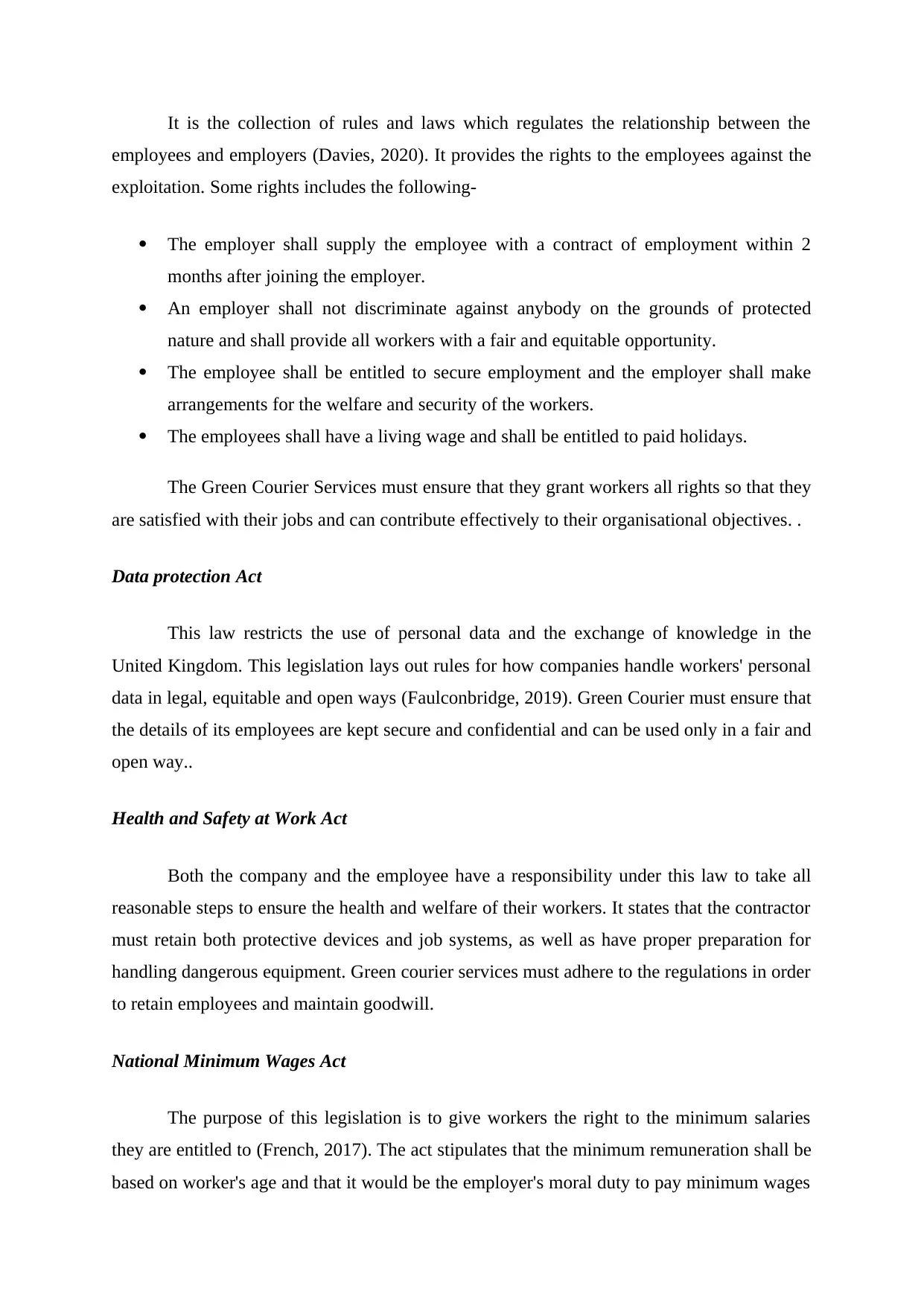
It is the collection of rules and laws which regulates the relationship between the
employees and employers (Davies, 2020). It provides the rights to the employees against the
exploitation. Some rights includes the following-
The employer shall supply the employee with a contract of employment within 2
months after joining the employer.
An employer shall not discriminate against anybody on the grounds of protected
nature and shall provide all workers with a fair and equitable opportunity.
The employee shall be entitled to secure employment and the employer shall make
arrangements for the welfare and security of the workers.
The employees shall have a living wage and shall be entitled to paid holidays.
The Green Courier Services must ensure that they grant workers all rights so that they
are satisfied with their jobs and can contribute effectively to their organisational objectives. .
Data protection Act
This law restricts the use of personal data and the exchange of knowledge in the
United Kingdom. This legislation lays out rules for how companies handle workers' personal
data in legal, equitable and open ways (Faulconbridge, 2019). Green Courier must ensure that
the details of its employees are kept secure and confidential and can be used only in a fair and
open way..
Health and Safety at Work Act
Both the company and the employee have a responsibility under this law to take all
reasonable steps to ensure the health and welfare of their workers. It states that the contractor
must retain both protective devices and job systems, as well as have proper preparation for
handling dangerous equipment. Green courier services must adhere to the regulations in order
to retain employees and maintain goodwill.
National Minimum Wages Act
The purpose of this legislation is to give workers the right to the minimum salaries
they are entitled to (French, 2017). The act stipulates that the minimum remuneration shall be
based on worker's age and that it would be the employer's moral duty to pay minimum wages
employees and employers (Davies, 2020). It provides the rights to the employees against the
exploitation. Some rights includes the following-
The employer shall supply the employee with a contract of employment within 2
months after joining the employer.
An employer shall not discriminate against anybody on the grounds of protected
nature and shall provide all workers with a fair and equitable opportunity.
The employee shall be entitled to secure employment and the employer shall make
arrangements for the welfare and security of the workers.
The employees shall have a living wage and shall be entitled to paid holidays.
The Green Courier Services must ensure that they grant workers all rights so that they
are satisfied with their jobs and can contribute effectively to their organisational objectives. .
Data protection Act
This law restricts the use of personal data and the exchange of knowledge in the
United Kingdom. This legislation lays out rules for how companies handle workers' personal
data in legal, equitable and open ways (Faulconbridge, 2019). Green Courier must ensure that
the details of its employees are kept secure and confidential and can be used only in a fair and
open way..
Health and Safety at Work Act
Both the company and the employee have a responsibility under this law to take all
reasonable steps to ensure the health and welfare of their workers. It states that the contractor
must retain both protective devices and job systems, as well as have proper preparation for
handling dangerous equipment. Green courier services must adhere to the regulations in order
to retain employees and maintain goodwill.
National Minimum Wages Act
The purpose of this legislation is to give workers the right to the minimum salaries
they are entitled to (French, 2017). The act stipulates that the minimum remuneration shall be
based on worker's age and that it would be the employer's moral duty to pay minimum wages
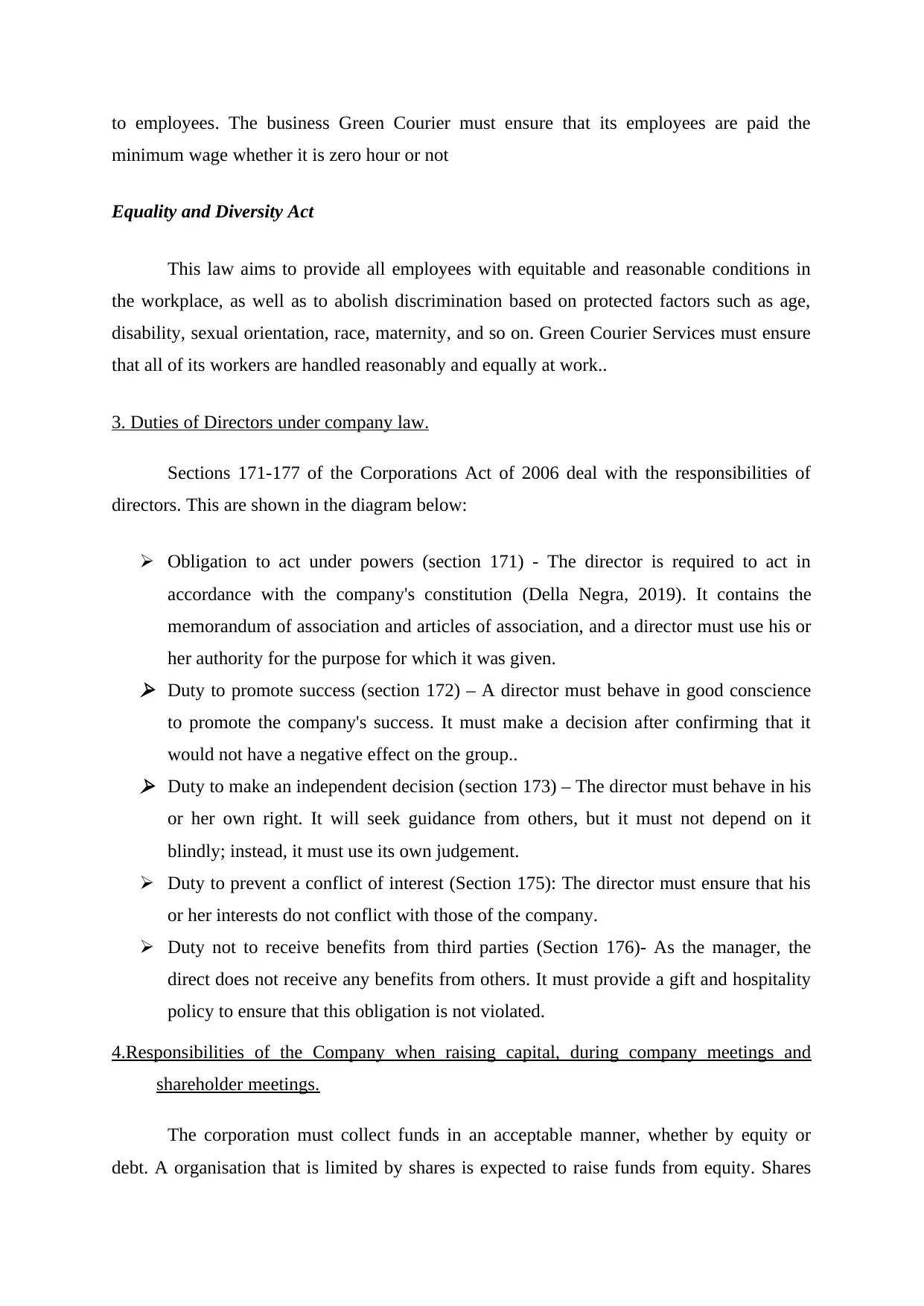
to employees. The business Green Courier must ensure that its employees are paid the
minimum wage whether it is zero hour or not
Equality and Diversity Act
This law aims to provide all employees with equitable and reasonable conditions in
the workplace, as well as to abolish discrimination based on protected factors such as age,
disability, sexual orientation, race, maternity, and so on. Green Courier Services must ensure
that all of its workers are handled reasonably and equally at work..
3. Duties of Directors under company law.
Sections 171-177 of the Corporations Act of 2006 deal with the responsibilities of
directors. This are shown in the diagram below:
Obligation to act under powers (section 171) - The director is required to act in
accordance with the company's constitution (Della Negra, 2019). It contains the
memorandum of association and articles of association, and a director must use his or
her authority for the purpose for which it was given. Duty to promote success (section 172) – A director must behave in good conscience
to promote the company's success. It must make a decision after confirming that it
would not have a negative effect on the group.. Duty to make an independent decision (section 173) – The director must behave in his
or her own right. It will seek guidance from others, but it must not depend on it
blindly; instead, it must use its own judgement.
Duty to prevent a conflict of interest (Section 175): The director must ensure that his
or her interests do not conflict with those of the company.
Duty not to receive benefits from third parties (Section 176)- As the manager, the
direct does not receive any benefits from others. It must provide a gift and hospitality
policy to ensure that this obligation is not violated.
4.Responsibilities of the Company when raising capital, during company meetings and
shareholder meetings.
The corporation must collect funds in an acceptable manner, whether by equity or
debt. A organisation that is limited by shares is expected to raise funds from equity. Shares
minimum wage whether it is zero hour or not
Equality and Diversity Act
This law aims to provide all employees with equitable and reasonable conditions in
the workplace, as well as to abolish discrimination based on protected factors such as age,
disability, sexual orientation, race, maternity, and so on. Green Courier Services must ensure
that all of its workers are handled reasonably and equally at work..
3. Duties of Directors under company law.
Sections 171-177 of the Corporations Act of 2006 deal with the responsibilities of
directors. This are shown in the diagram below:
Obligation to act under powers (section 171) - The director is required to act in
accordance with the company's constitution (Della Negra, 2019). It contains the
memorandum of association and articles of association, and a director must use his or
her authority for the purpose for which it was given. Duty to promote success (section 172) – A director must behave in good conscience
to promote the company's success. It must make a decision after confirming that it
would not have a negative effect on the group.. Duty to make an independent decision (section 173) – The director must behave in his
or her own right. It will seek guidance from others, but it must not depend on it
blindly; instead, it must use its own judgement.
Duty to prevent a conflict of interest (Section 175): The director must ensure that his
or her interests do not conflict with those of the company.
Duty not to receive benefits from third parties (Section 176)- As the manager, the
direct does not receive any benefits from others. It must provide a gift and hospitality
policy to ensure that this obligation is not violated.
4.Responsibilities of the Company when raising capital, during company meetings and
shareholder meetings.
The corporation must collect funds in an acceptable manner, whether by equity or
debt. A organisation that is limited by shares is expected to raise funds from equity. Shares
⊘ This is a preview!⊘
Do you want full access?
Subscribe today to unlock all pages.

Trusted by 1+ million students worldwide
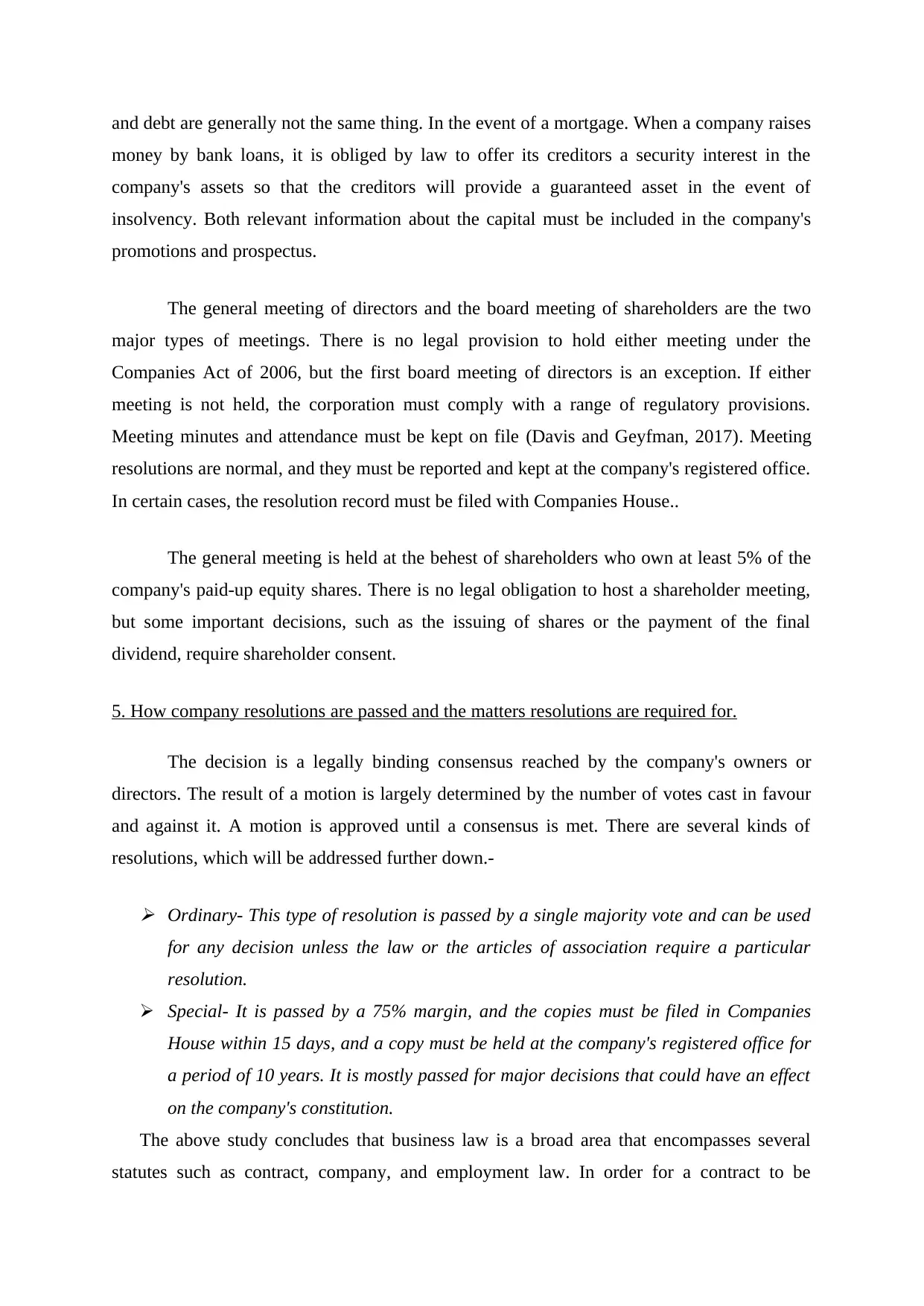
and debt are generally not the same thing. In the event of a mortgage. When a company raises
money by bank loans, it is obliged by law to offer its creditors a security interest in the
company's assets so that the creditors will provide a guaranteed asset in the event of
insolvency. Both relevant information about the capital must be included in the company's
promotions and prospectus.
The general meeting of directors and the board meeting of shareholders are the two
major types of meetings. There is no legal provision to hold either meeting under the
Companies Act of 2006, but the first board meeting of directors is an exception. If either
meeting is not held, the corporation must comply with a range of regulatory provisions.
Meeting minutes and attendance must be kept on file (Davis and Geyfman, 2017). Meeting
resolutions are normal, and they must be reported and kept at the company's registered office.
In certain cases, the resolution record must be filed with Companies House..
The general meeting is held at the behest of shareholders who own at least 5% of the
company's paid-up equity shares. There is no legal obligation to host a shareholder meeting,
but some important decisions, such as the issuing of shares or the payment of the final
dividend, require shareholder consent.
5. How company resolutions are passed and the matters resolutions are required for.
The decision is a legally binding consensus reached by the company's owners or
directors. The result of a motion is largely determined by the number of votes cast in favour
and against it. A motion is approved until a consensus is met. There are several kinds of
resolutions, which will be addressed further down.-
Ordinary- This type of resolution is passed by a single majority vote and can be used
for any decision unless the law or the articles of association require a particular
resolution.
Special- It is passed by a 75% margin, and the copies must be filed in Companies
House within 15 days, and a copy must be held at the company's registered office for
a period of 10 years. It is mostly passed for major decisions that could have an effect
on the company's constitution.
The above study concludes that business law is a broad area that encompasses several
statutes such as contract, company, and employment law. In order for a contract to be
money by bank loans, it is obliged by law to offer its creditors a security interest in the
company's assets so that the creditors will provide a guaranteed asset in the event of
insolvency. Both relevant information about the capital must be included in the company's
promotions and prospectus.
The general meeting of directors and the board meeting of shareholders are the two
major types of meetings. There is no legal provision to hold either meeting under the
Companies Act of 2006, but the first board meeting of directors is an exception. If either
meeting is not held, the corporation must comply with a range of regulatory provisions.
Meeting minutes and attendance must be kept on file (Davis and Geyfman, 2017). Meeting
resolutions are normal, and they must be reported and kept at the company's registered office.
In certain cases, the resolution record must be filed with Companies House..
The general meeting is held at the behest of shareholders who own at least 5% of the
company's paid-up equity shares. There is no legal obligation to host a shareholder meeting,
but some important decisions, such as the issuing of shares or the payment of the final
dividend, require shareholder consent.
5. How company resolutions are passed and the matters resolutions are required for.
The decision is a legally binding consensus reached by the company's owners or
directors. The result of a motion is largely determined by the number of votes cast in favour
and against it. A motion is approved until a consensus is met. There are several kinds of
resolutions, which will be addressed further down.-
Ordinary- This type of resolution is passed by a single majority vote and can be used
for any decision unless the law or the articles of association require a particular
resolution.
Special- It is passed by a 75% margin, and the copies must be filed in Companies
House within 15 days, and a copy must be held at the company's registered office for
a period of 10 years. It is mostly passed for major decisions that could have an effect
on the company's constitution.
The above study concludes that business law is a broad area that encompasses several
statutes such as contract, company, and employment law. In order for a contract to be
Paraphrase This Document
Need a fresh take? Get an instant paraphrase of this document with our AI Paraphraser
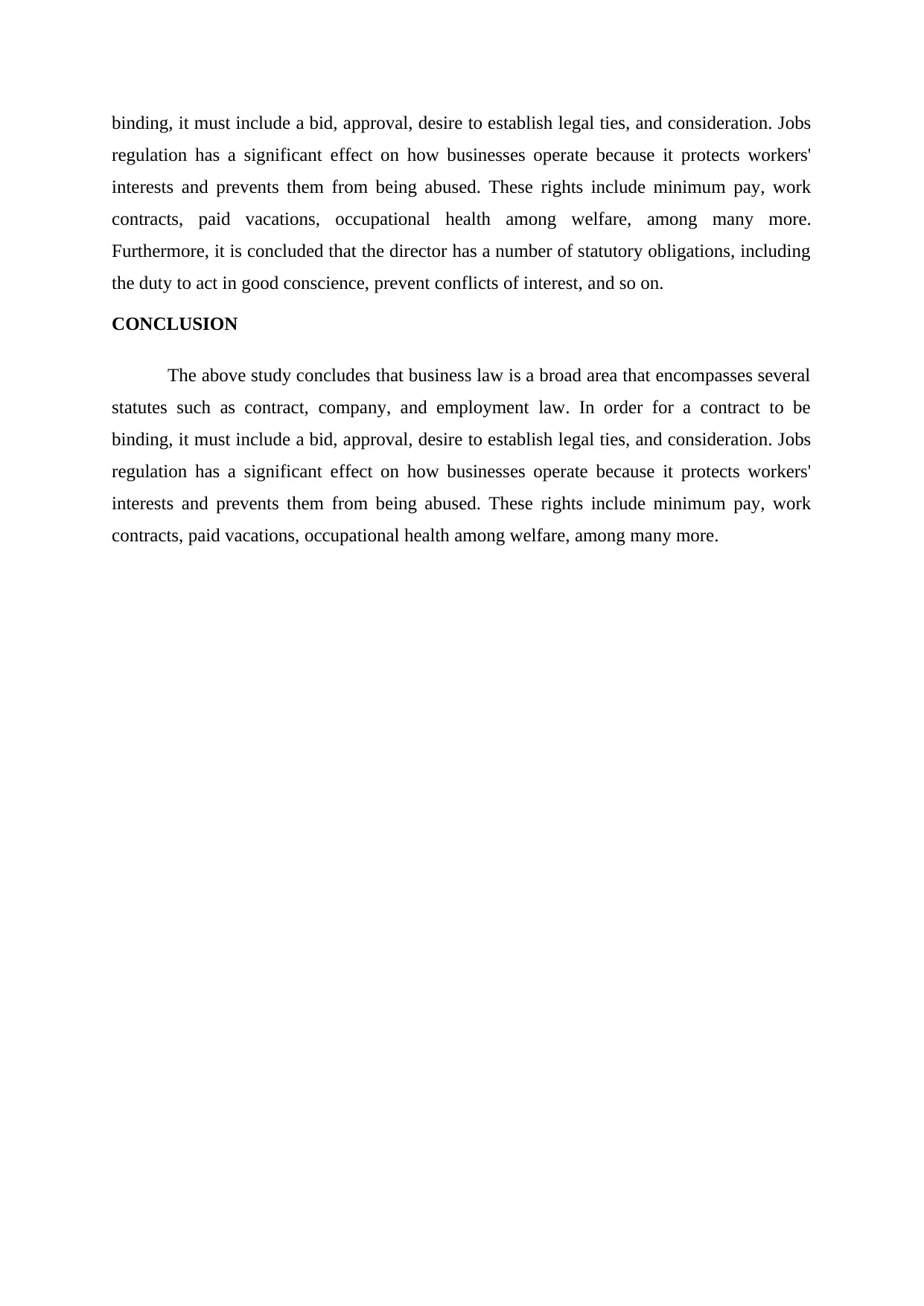
binding, it must include a bid, approval, desire to establish legal ties, and consideration. Jobs
regulation has a significant effect on how businesses operate because it protects workers'
interests and prevents them from being abused. These rights include minimum pay, work
contracts, paid vacations, occupational health among welfare, among many more.
Furthermore, it is concluded that the director has a number of statutory obligations, including
the duty to act in good conscience, prevent conflicts of interest, and so on.
CONCLUSION
The above study concludes that business law is a broad area that encompasses several
statutes such as contract, company, and employment law. In order for a contract to be
binding, it must include a bid, approval, desire to establish legal ties, and consideration. Jobs
regulation has a significant effect on how businesses operate because it protects workers'
interests and prevents them from being abused. These rights include minimum pay, work
contracts, paid vacations, occupational health among welfare, among many more.
regulation has a significant effect on how businesses operate because it protects workers'
interests and prevents them from being abused. These rights include minimum pay, work
contracts, paid vacations, occupational health among welfare, among many more.
Furthermore, it is concluded that the director has a number of statutory obligations, including
the duty to act in good conscience, prevent conflicts of interest, and so on.
CONCLUSION
The above study concludes that business law is a broad area that encompasses several
statutes such as contract, company, and employment law. In order for a contract to be
binding, it must include a bid, approval, desire to establish legal ties, and consideration. Jobs
regulation has a significant effect on how businesses operate because it protects workers'
interests and prevents them from being abused. These rights include minimum pay, work
contracts, paid vacations, occupational health among welfare, among many more.
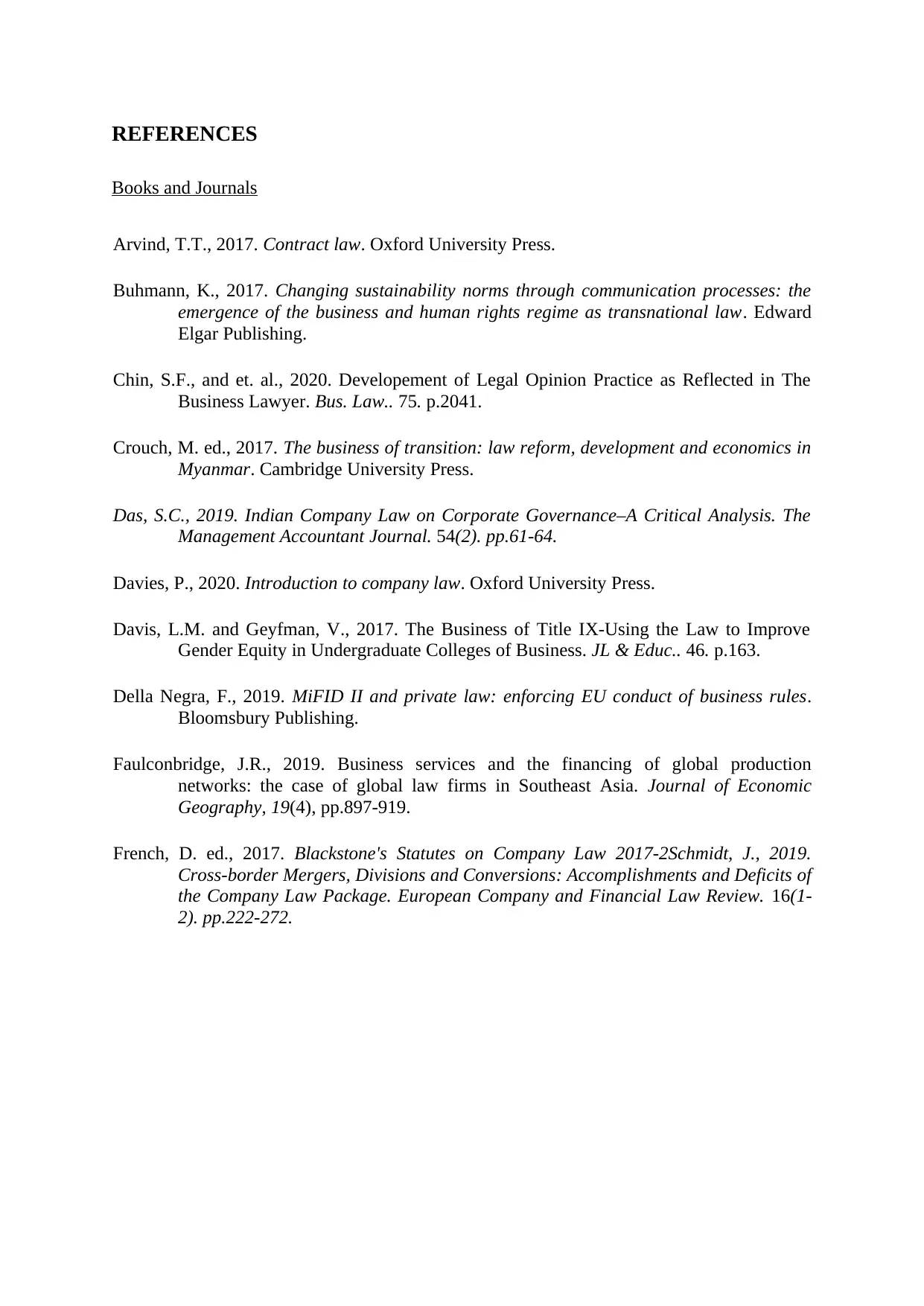
REFERENCES
Books and Journals
Arvind, T.T., 2017. Contract law. Oxford University Press.
Buhmann, K., 2017. Changing sustainability norms through communication processes: the
emergence of the business and human rights regime as transnational law. Edward
Elgar Publishing.
Chin, S.F., and et. al., 2020. Developement of Legal Opinion Practice as Reflected in The
Business Lawyer. Bus. Law.. 75. p.2041.
Crouch, M. ed., 2017. The business of transition: law reform, development and economics in
Myanmar. Cambridge University Press.
Das, S.C., 2019. Indian Company Law on Corporate Governance–A Critical Analysis. The
Management Accountant Journal. 54(2). pp.61-64.
Davies, P., 2020. Introduction to company law. Oxford University Press.
Davis, L.M. and Geyfman, V., 2017. The Business of Title IX-Using the Law to Improve
Gender Equity in Undergraduate Colleges of Business. JL & Educ.. 46. p.163.
Della Negra, F., 2019. MiFID II and private law: enforcing EU conduct of business rules.
Bloomsbury Publishing.
Faulconbridge, J.R., 2019. Business services and the financing of global production
networks: the case of global law firms in Southeast Asia. Journal of Economic
Geography, 19(4), pp.897-919.
French, D. ed., 2017. Blackstone's Statutes on Company Law 2017-2Schmidt, J., 2019.
Cross-border Mergers, Divisions and Conversions: Accomplishments and Deficits of
the Company Law Package. European Company and Financial Law Review. 16(1-
2). pp.222-272.
Books and Journals
Arvind, T.T., 2017. Contract law. Oxford University Press.
Buhmann, K., 2017. Changing sustainability norms through communication processes: the
emergence of the business and human rights regime as transnational law. Edward
Elgar Publishing.
Chin, S.F., and et. al., 2020. Developement of Legal Opinion Practice as Reflected in The
Business Lawyer. Bus. Law.. 75. p.2041.
Crouch, M. ed., 2017. The business of transition: law reform, development and economics in
Myanmar. Cambridge University Press.
Das, S.C., 2019. Indian Company Law on Corporate Governance–A Critical Analysis. The
Management Accountant Journal. 54(2). pp.61-64.
Davies, P., 2020. Introduction to company law. Oxford University Press.
Davis, L.M. and Geyfman, V., 2017. The Business of Title IX-Using the Law to Improve
Gender Equity in Undergraduate Colleges of Business. JL & Educ.. 46. p.163.
Della Negra, F., 2019. MiFID II and private law: enforcing EU conduct of business rules.
Bloomsbury Publishing.
Faulconbridge, J.R., 2019. Business services and the financing of global production
networks: the case of global law firms in Southeast Asia. Journal of Economic
Geography, 19(4), pp.897-919.
French, D. ed., 2017. Blackstone's Statutes on Company Law 2017-2Schmidt, J., 2019.
Cross-border Mergers, Divisions and Conversions: Accomplishments and Deficits of
the Company Law Package. European Company and Financial Law Review. 16(1-
2). pp.222-272.
⊘ This is a preview!⊘
Do you want full access?
Subscribe today to unlock all pages.

Trusted by 1+ million students worldwide
1 out of 9
Related Documents
Your All-in-One AI-Powered Toolkit for Academic Success.
+13062052269
info@desklib.com
Available 24*7 on WhatsApp / Email
![[object Object]](/_next/static/media/star-bottom.7253800d.svg)
Unlock your academic potential
Copyright © 2020–2026 A2Z Services. All Rights Reserved. Developed and managed by ZUCOL.





